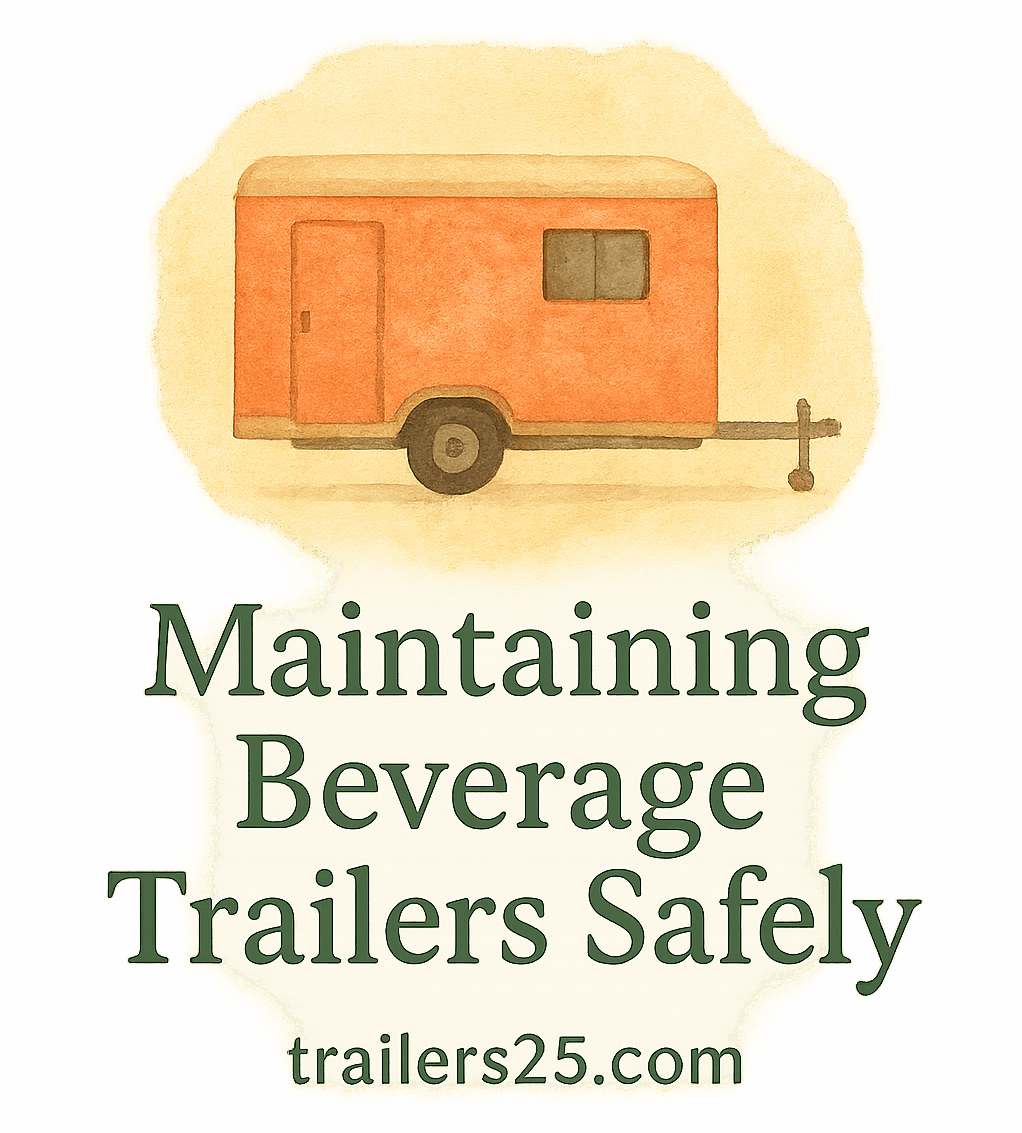Introduction: Why Beverage Trailer Maintenance Matters
If you own a beverage trailer, you already know how much of a business booster it can be. From mobile bars at festivals to event catering, these trailers keep customers refreshed and profits flowing. But here’s the thing—without proper care, beverage trailers can quickly become a safety hazard. Poor upkeep leads to accidents, costly repairs, and even health risks.
That’s why sticking to regular trailer maintenance isn’t just smart—it’s essential. In this guide, we’ll cover 10 maintenance tips to keep beverage trailers safe, while also pointing you toward expert resources on maintenance, safety compliance, and cost-saving upgrades.
Understanding Beverage Trailers
What Is a Beverage Trailer?
A beverage trailer is essentially a mobile bar or refreshment station equipped with refrigeration, taps, sinks, and storage. If you’re still exploring options, check out this trailer buying guide to learn what to look for before investing.
The Role of Safety in Beverage Trailers
Since these trailers combine mobility, food handling, and customer service, they must meet strict safety and compliance rules. Ignoring maintenance can lead to sanitation issues, breakdowns, or violations of business compliance regulations.

Common Issues Faced Without Proper Maintenance
Mechanical Problems
Brake failures, worn tires, or loose hitches can result in serious road accidents. Learn more about common trailer issues that operators face.
Sanitation Concerns
Dirty taps, poor refrigeration, or neglected sinks can lead to contaminated drinks—hurting your reputation and bottom line. You’ll find useful insights in our food safety tips.
Safety Hazards
From faulty wiring to outdated fire extinguishers, small issues can escalate into major risks. Explore trailer safety essentials for more.
10 Maintenance Tips to Keep Beverage Trailers Safe
1. Regular Brake and Tire Checks
Your brakes and tires are your trailer’s lifeline. Neglecting them can lead to costly accidents. Refer to our trailer maintenance guide for detailed inspection steps.
2. Keep Electrical Systems in Check
Faulty wiring is a fire hazard. Inspect connections, replace damaged wires, and keep your trailer’s battery charged. You can also read more on essential trailer equipment.
3. Inspect the Trailer Hitch and Coupling System
A loose or rusty hitch is a disaster waiting to happen. Always check locks, safety chains, and grease points. For a safe purchase, see these tips for buying trailers.
4. Maintain Proper Sanitation Practices
Cleanliness is crucial. Daily cleaning and weekly deep sanitization ensure beverages remain safe. Explore food safety compliance tips to avoid penalties.
5. Lubricate Moving Parts Frequently
Doors, hinges, and couplings need regular lubrication. This prevents breakdowns and extends trailer life. You’ll find practical hacks under affordable maintenance tips.
6. Check the Cooling and Refrigeration Units
A failed refrigeration unit means warm drinks and lost sales. Use cost-saving maintenance strategies to keep systems efficient.
7. Monitor Structural Integrity
Keep an eye on the frame, seals, and panels. Rust-proof coatings can save you money in the long run. See our guide on common trailer repair needs.
8. Update Safety Equipment
From fire extinguishers to first aid kits, safety gear should never be outdated. Visit our section on trailer tools and accessories for must-haves.
9. Maintain Proper Documentation and Compliance
Health permits, inspection logs, and legal documents must always be up to date. Check out these legal tips for trailer businesses.
10. Schedule Professional Inspections
DIY checks are good, but expert eyes catch hidden issues. To avoid common buying mistakes later, book annual professional servicing.
Cost-Effective Maintenance Practices
DIY vs Professional Repairs
You can handle basic upkeep yourself, but leave brakes, refrigeration, and electrical work to experts. Learn which trailer operations can be DIY.
Smart Investments in Tools
Owning the right trailer tools makes maintenance faster and cheaper.
The Long-Term Benefits of Trailer Maintenance
Safety for Your Team and Customers
A well-kept trailer is a trustworthy trailer. Customers feel safer buying from clean, reliable setups.
Extended Trailer Lifespan
Proper trailer upgrades and care extend your investment’s life, saving you thousands.
Conclusion
Your beverage trailer is more than a business—it’s your mobile reputation. By following these 10 maintenance tips to keep beverage trailers safe, you’ll ensure smooth operations, customer trust, and fewer costly breakdowns. For more practical guides, explore our business tips section to keep your venture thriving.
FAQs
1. How often should I clean my beverage trailer?
Daily cleaning is essential, with deep sanitation weekly. See more in our maintenance guide.
2. What’s the biggest safety risk for beverage trailers?
Brake and tire failures are common, followed by poor refrigeration.
3. Do beverage trailers require permits?
Yes, most regions require business compliance permits.
4. Can I handle electrical repairs myself?
Basic wiring checks are fine, but complex issues need experts.
5. What tools should I always keep on board?
A tire gauge, multimeter, lubricants, and a stocked trailer toolkit.
6. How do I extend the life of my trailer?
Regular maintenance, smart cost-effective tips, and annual professional inspections.
7. Why should I follow compliance rules?
Because failing to meet legal requirements can shut your business down instantly.
